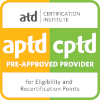Certificate Suite Details
Key Features
- Mobile-friendly
- Fully accessible
- Audio-enabled
- Expert-supported
- Badge and credit-awarding
- Real-world case studies
- Games & Flashcards
- Video content
Certificate Preview
Certificate Description
Learner Feedback
Courses Included in this Certificate
Course Description
This course provides an overview of key business concepts—applicable to freelance designers, designers who are sole proprietors or lead their own design firms, and designers working in large or small firms. The course explores key concepts of effective leadership, management, and team development. Learners will review people and project management skills and practice applying their learning in real-world scenarios. Next, learners will dive into business strategy, examining the importance of strategic thinking and practicing different methods for strategic planning. Lastly, the course covers the financial side of the business, giving a high-level overview of important accounting and finance terminology, which designers can use to better understand how to design efforts that fit into the larger financial goals and objectives.
Course Credits
Course Description
Successful organizations know the value of design. Because thoughtful design is a driver of organizational success, designers are often required to wear many hats—innovator, leader, and problem-solver, just to name a few. This course provides design professionals with an overview of key design principles and practices, providing a shared language for describing the creative and complex role that designers play within their organizations. The course also explores methods for fostering innovation, solving complex problems with design, and communicating the value of design with data. Through interactive games and exercises, learners will engage with key concepts and apply their learning to real-world scenarios and case studies. The course is designed for early-career and seasoned professionals alike, offering engaging instructional content for designers at all levels who want to sharpen their understanding of design principles, tools, and best practices.
Course Credits
Course Description
Designers across all specializations and industries must have a working knowledge of relevant laws and basic legal concepts. This course covers legal topics relevant to designers, including copyright and intellectual property, contracts and nondisclosure agreements, and legal requirements for accessible design. Through this course, designers will learn about laws most relevant to their work.
Please note: This course covers the basics of law but is not meant to provide legal advice. If you require legal advice or other expert assistance, please seek the services of a professional. While every designer should be familiar with relevant legal issues, there is no substitute for having qualified legal counsel.
Course Credits
Course Description
This course introduces designers to concepts related to standards of practice, including ethics, accessibility, and diversity and inclusion. Because design is often intertwined with the culture, brand, and vision of an organization, designers play a key role in promoting ethical and inclusive business practices. This course equips designers with the foundational knowledge necessary to make a positive impact in their organizations and their work. Through a series of interactive exercises and case studies, designers can test their knowledge and apply what they're learning to real-world scenarios.
Course Credits
Course Description
This course introduces the learner to the topics covered in this course bundle, as well as the process for earning ACE CREDIT®.
Course Description
This is the final exam course for this ACE CREDIT®-bearing bundle. This course is not available for individual sale.
Course Credits
Notes
This course has an "Ask the Expert" feature, which submits your questions directly to an expert in the field you are studying. Questions are answered as quickly as possible and usually within 24 hours.
As an Accredited Provider, MindEdge offers for its learning events that comply with the Continuing Education and Training Standard.
Learners must achieve an average test score of at least 70% to meet the minimum successful completion requirement and qualify to receive credit. Learners will have three attempts at all graded assessments.


